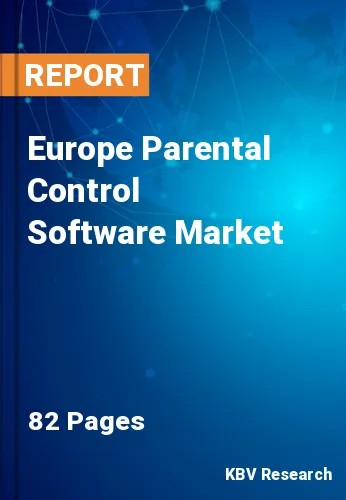The Europe Parental Control Software Market would witness market growth of 11.2% CAGR during the forecast period (2022-2028).
Setting parental controls and time restrictions on digital devices is crucial until kids and teenagers are old enough to manage the responsibility independently. There is a tonne of objectionable stuff on the internet, so even if kids aren't looking for it, they might still find it. Parents can prevent their children from accessing particular applications and websites using parental control software.
Nevertheless, parents cannot block every website that can be objectionable to their kids. However, parents can prevent access to certain digital pathways or categories by using parental controls. For instance, parents can restrict any websites containing gambling or pornographic content. This can shield them from graphic material and stop them from downloading apps without parental consent.
Setting time limits for digital gadgets is just as crucial as parental controls. Digital blue light, a high energy wavelength on the visible light spectrum, is known to be emitted by digital screens. This wavelength can lead to burnout, headaches, eye tiredness and redness, interrupted sleep cycles, and other problems. This is because the high-energy wavelength stimulates the eye and mind like the blue light that the sun naturally emits.
In the United Kingdom, for the year ending in march 2020, 22 percent of children and adolescents 10 to 15 who had encountered some form of online bullying behavior reported that these occurrences had had a significant emotional impact on them. The online bullying behaviors experienced by children harmed their mental well-being in about 7 out of 10 cases. Children who used social networking sites for more than three hours during a school day were twice as likely to indicate having high or very high ratings for mental illness. Law No. 2022-300 of March 2, 2022, has enhanced parental control over internet access in France. On relevant gadgets, the law mandates the installation of a parental control system that is simple to use and understand. This supports the growth of the regional market.
The Germany market dominated the Europe Parental Control Software Market by Country in 2021, and would continue to be a dominant market till 2028; thereby, achieving a market value of $165.2 Million by 2028. The UK market is anticipated to grow at a CAGR of 10.2% during (2022 - 2028). Additionally, The France market would exhibit a CAGR of 12.1% during (2022 - 2028).
Based on Deployment Mode, the market is segmented into On-premise and Cloud. Based on Application, the market is segmented into Residential and Commercial. Based on Platform, the market is segmented into Windows, Android and iOS & Others. Based on countries, the market is segmented into Germany, UK, France, Russia, Spain, Italy, and Rest of Europe.
Free Valuable Insights: The Global Parental Control Software Market will Hit $2.7 Billion by 2028, at a CAGR of 11.9%
The market research report covers the analysis of key stake holders of the market. Key companies profiled in the report include NortonLifeLock, Inc., Microsoft Corporation, Google LLC (Alphabet, Inc.), Cisco Systems, Inc., Verizon Communications, Inc., McAfee Corp., AT&T, Inc., SafeDNS, Inc., SentryPC, and Kaspersky Lab.
By Deployment Mode
By Application
By Platform
By Country
Our team of dedicated experts can provide you with attractive expansion opportunities for your business.

